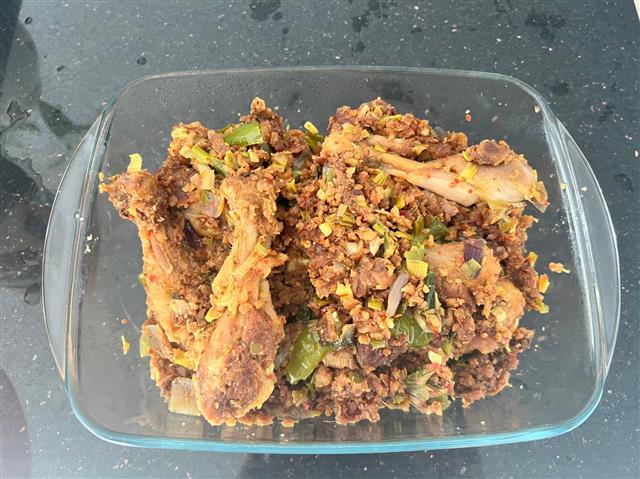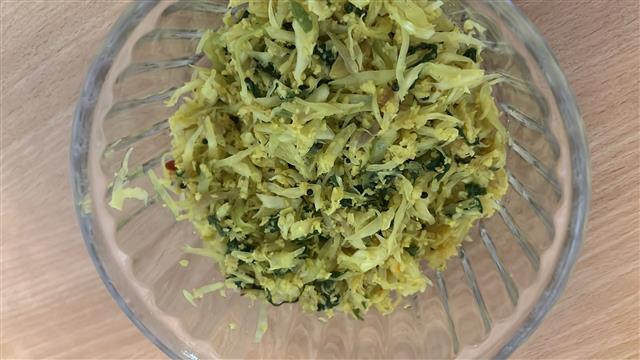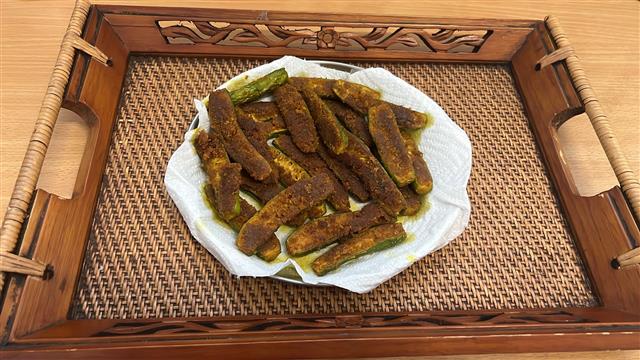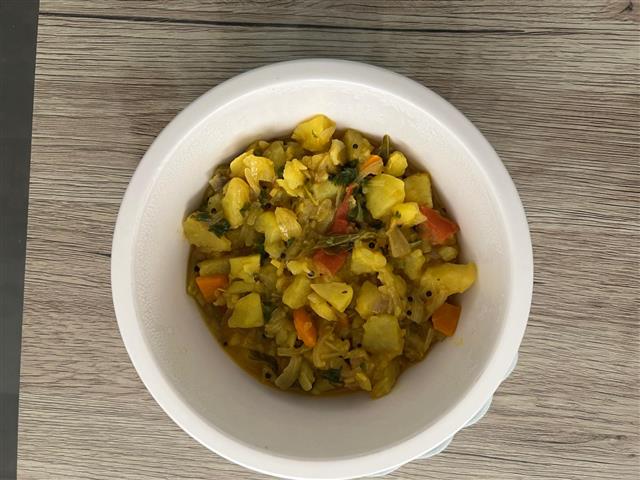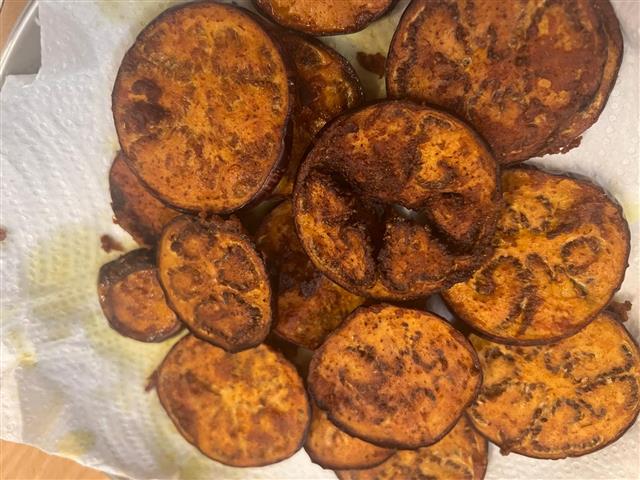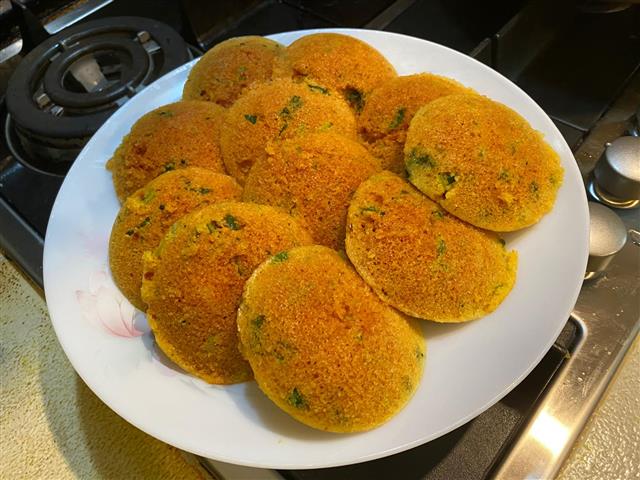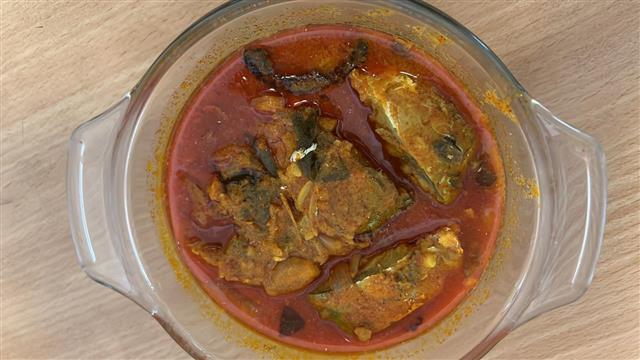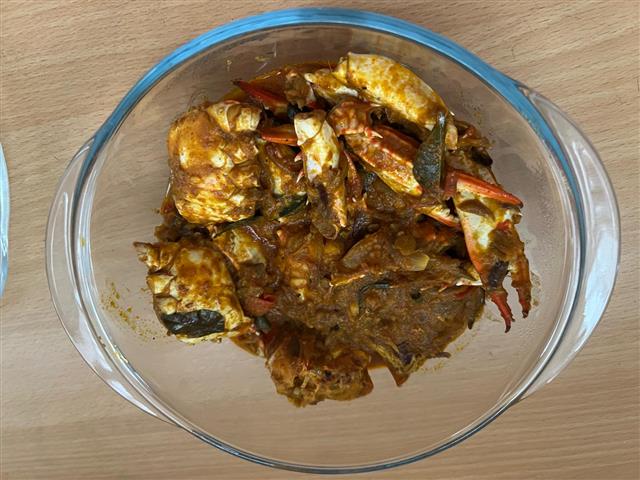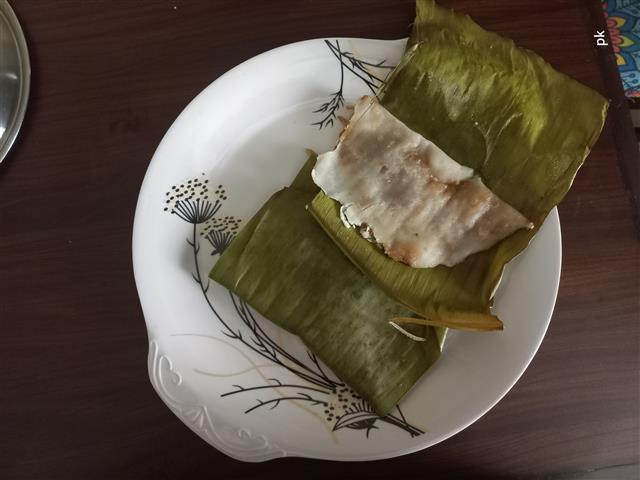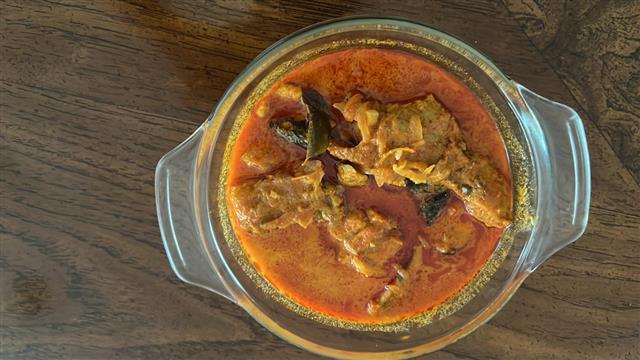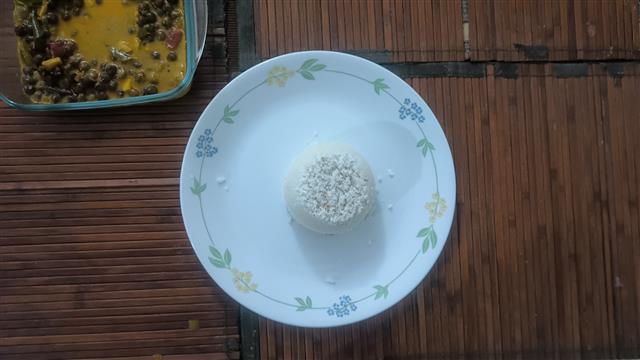
Chicken Biriyani
(4 reviews)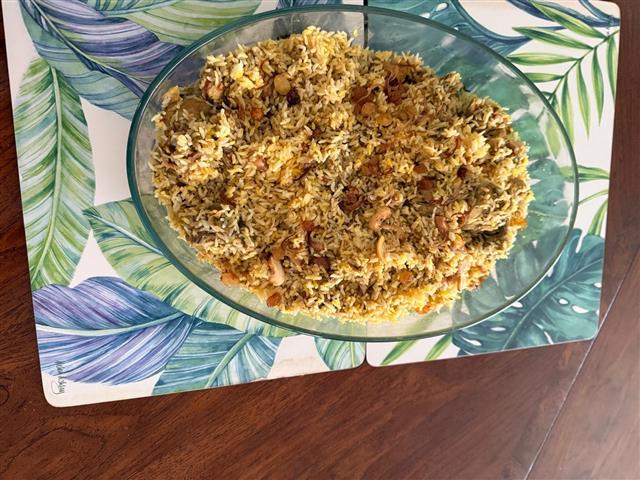
Another delicious biryani dish (like the fish biryani). This dish has layers of chicken, spiced ghee rice, caramelised onions, fresh herbs, and warming Indian spices. Yoghurt adds creaminess and balances the heat from the masalas.
Kerala-style Chicken Biryani is a heartier biryani as compared to the lighter fish-based ones. The spices are intense, and each grain of the Jeerakasala rice is fragrant. The chicken is well-spiced with both whole ingredients and biryani masala. This gives you a chicken and rice dish that tantalises your tastebuds.
This biryani recipe retains the Kerala touch and the rich culinary heritage of the Indian subcontinent. Every bite tells a story about cultural exchanges and traditional cooking techniques.
Ingredients
Directions
- Rinse jeerakasala rice and soak in water for 20 minutes. Rinse and make ghee rice. Heat oil and ghee in a frying pan.
- Add the curry leaves, the rice and cinnamon and saute for 2 to 3 minutes on low heat.
- Cook it with salt, lemon juice and water for 15 minutes. Cook the rice without it getting thick.
- In the meantime marinate the chicken in a mixture of curd or yoghurt, one teasooon of biryani masala one tablespoon of ginger garlic paste, salt, and turmeric powder for one hour in the fridge.
- Cut 2 onions lengthwise. Heat one tablespoon oil or ghee in a frying pan and fry the onions. Remove and set aside.
- Add one tablespoon of oil or ghee, Fry cashew nuts and raisins until golden brown in the same pan.
- In a bowl, add 3 chopped onions, 2 tablespoon of ginger garlic paste, green chillies, 3 teaspoons of biryani masala, tomatoes, and mix well.
- Heat one tablespoon of oil in a pan. Saute the mixture until it is done, for 8 minutes. When the paste is done, add in marinated chicken, and one cup of water and cook for 10 to 12 minutes minutes.
- In a large vessel, layer the Biryani. Add a layer of cooked rice followed by all the cooked chicken curry and half the fried onions set aside.
- Top with chopped coriander and mint leaves. Repeat with another layer of rice and the remaining fried onions.
- Top with cashews and raisins. Cook with a lid on for 20 to 25 minutes on low heat.
Cooking Tips
• Use jeerakasala rice for Kerala style: This short-grain rice or kaima rice cooks faster than basmati and soaks up flavours more easily.
• Cook rice with spices and turmeric: Add these to boiling water when cooking rice. This infuses the rice without the need for extra masala.
• Marinate the chicken with curd and spices: Curd allows the chicken to get tender and marinating for at least an hour improves overall flavour.
• Cook the chicken until well done: Since the chicken is layered and cooked again with rice, overcooking will make it stringy. Cook it until just done.
Marination Tips
• Add the spices and curd or yoghurt for the marinade, along with salt and lemon juice, to a bowl.
• Let the chicken soak in the marinade for an hour in the fridge.
How to Serve
• With raita or onion salad
• Papadam or banana chips
• Lime or vegetable pickle
• A glass of lime juice or jeera water
The Story Behind Chicken Biriyani
Kerala Chicken Biryani, especially the Malabar version, is a gently layered one-pot meal that celebrates warm spices, ghee rice, and perfectly cooked meat. Short-grain jeerakasala rice is used in this biryani recipe, making it distinct from its Northern and Hyderbadi counterparts that rely on basmati rice.
What sets it apart from Fish Biryani is the addition of yoghurt, biryani masala, and cashews, which give it a comforting and intense flavour. Each bite offers you the zest of spices, the juiciness of curd-marinated chicken, and the melty texture of ghee-infused grains.
Onions play a prominent role being suued in the layering and while cookign the marinated chicken.
What Is Kerala Chicken Biryani?
Kerala Chicken Biryani is a layered rice and chicken dish made with marinated chicken cooked in spiced yoghurt masala, jeerakasala rice, and toppings of fried onions, herbs, nuts, and raisins. It's cooked using the dum method, where steam is trapped in a lidded pot to finish the dish slowly and evenly.
This biryani is distict is many ways.
For one, the dish uses jeerakasala rice with its soft texture.Fried onions and curd-based masala, creating a sweet-savoury flavour. Minimal oil and ghee is required, as compared to other biryanis. Instead, curd and cashews lend richness. Spices like turmeric, cinnamon, and green chillies are prominent, but the curd cuts off some of the heat.
While not a weekday staple, Chicken Biryani is seen on festive tables across Kerala households. It is reserved for special occasions, from Eid and Onam to feasts and weddings in the Malabar region.
When it appears, it signals celebration, even if it's just cooking something with care on a less busy weekend.
Pro Tips for Perfect Results
→ Fry the onions slowly until deep golden: Properly browned onions add sweetness, texture, and depth.
→ Seal the pot with a lid: Cooking on low lets the flavours to mix without drying out the rice.
→ Use good quality curd: Full-fat yoghurt yields a creamy masala that clings to the chicken and flavours it deeply.
→ Always drain fried onions well: Too much oil on onions can make the biryani greasy.
Chicken Biriyani Variations
- Thalassery Biryani:
Made with less biryani masala. The chicken is cooked in a thin tomato-free masala and layered with ghee rice. A mildly sweet version with raisins and mint.
- Kozhikode Biryani:
Spicier than Thalassery's version and uses more onions and green chillies in the masala. Also includes tomato and coriander for tang.
- Palakkad Style:
Slightly drier and may use basmati rice and more whole spices. Ghee-fried cashews are a must. Occasionally flavoured with rose water.
- Kochi/Ernakulam:
Some households prepare chicken biryani with coconut milk in the masala base. More richer in texture.
- Travancore Region:
Sometimes includes curry leaves in the masala and may feature pepper and fennel. Cooked together like a pulav.
- Mutton or Beef Biryani:
Swap chicken for tender mutton or beef. Increase cooking time for the meat to become tender.
- Paneer or Mushroom Biryani:
For vegetarians, replace chicken with cubes of fried paneer or sautéed mushrooms. Add a handful of peas for colour and texture.
- No-Yoghurt Version:
For those avoiding dairy, use more tomatoes or tomato puree and lemon juice are used for acidity instead of curd.
Storing & Reheating Tips
→ Fridge: Store leftovers in an airtight container. Keeps well for up to 2 to 3 days.
→ Reheat: Sprinkle a few teaspoons of water and warm on a low flame, covered with a lid.
Tip: Avoid microwaving, as the rice dries out and chicken may turn hard and chewy.
→ Freeze: Not recommended. when thawed, the rice loses its bite and the chicken its tender texture.
Tip: Always serve hot. Cold biryani doesn't taste as good as warm.
Common Mistakes to Avoid
→ Using too much yoghurt: Excess curd waters down the masala. Stick to recipe proportions.
→ Overcooking rice: Rice should be 80–90% done before layering. Overcooked rice turns mushy during dum.
→ Skipping the lid: Always cover the pot tightly during final cooking to trap the aromas and steam.
→ Burning the chicken masala: Marinated chicken masala should be cooked on medium heat until oil separates. Don't rush this step.
→ Using wet chicken for marination: Always pat the chicken dry before marination to help the curd stick and avoid a watery masala.
Frequently Asked Questions
- Can I make this biryani ahead of time?
Yes! In fact, resting for a few hours enhances the flavour. Just reheat gently before serving.
- Can I use basmati rice instead of jeerakasala?
Yes, but you'll lose the signature texture and aroma. Adjust water and cooking time accordingly.
- Is this spicy?
No, Kerala biryani is fragrant and well-spiced but not overly hot. You can adjust green chilli levels to taste.
- Can I add vegetables?
You can layer with fried potato cubes, green peas, or even boiled eggs. Some versions include them for bulk and colour.
Equipment Needed
→ Heavy-Bottomed Pot or Kadai for making ghee rice
→ Flat Frying Pan to shallow fry the chicken
→ Wide Spoon or Slotted Spoon for layering
→ Lid or Damp Cloth to seal in the steam during final cooking
→ Bowls for mixing the marinade masala, and for soaking rice
